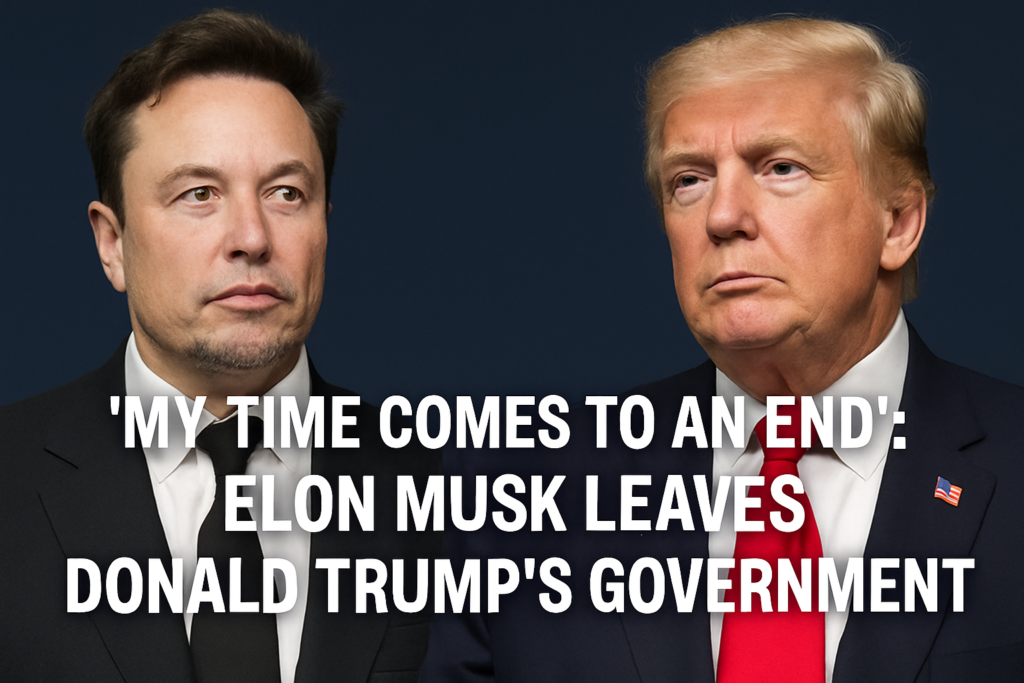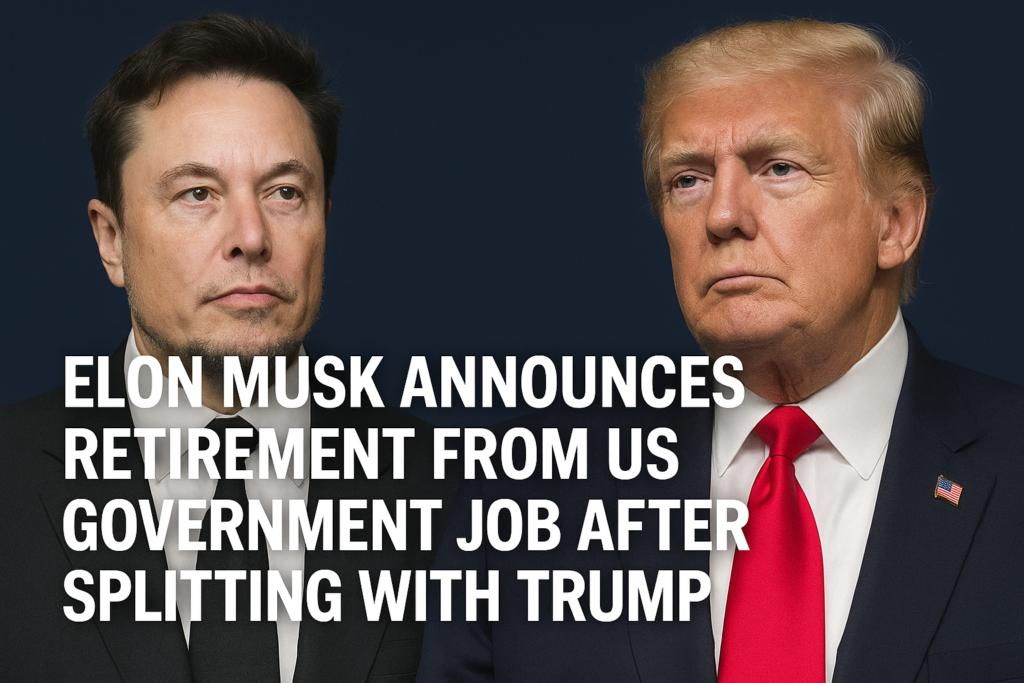Elon Musk ends his government role under Donald Trump, citing disagreements over spending and DOGE department struggles. Here’s the full story
A Surprise Exit from Washington
In a surprising turn of events, billionaire entrepreneur Elon Musk has officially ended his role in the Trump administration. Musk, who served as the head of the Department of Government Efficiency (DOGE), announced his departure just days before his 130-day term was due to expire on May 30.
The move comes amid growing tensions between Musk and President Donald Trump, especially over fiscal policy disagreements. Musk’s exit also coincides with several business setbacks and legal challenges, further fueling speculation about his priorities shifting back toward the private sector.
Elon Musk’s Role in the Trump Administration

The Formation of DOGE
DOGE, short for Department of Government Efficiency, was a brainchild of the Trump-Musk alliance formed in early 2024. Musk, already known for his disruptive approach in the tech and space industries, was granted sweeping authority by Trump to reorganize and streamline the federal government.
DOGE’s primary goal was to reduce bureaucratic inefficiencies and eliminate what Musk called “wasteful spending.” Under Musk’s leadership, thousands of government jobs were eliminated, and multiple federal departments were merged or shut down.
An Unelected but Powerful Position
Despite holding no elected office, Musk wielded enormous influence. His special government employee status gave him unprecedented access to federal resources and authority to implement cost-cutting measures. Musk frequently referred to DOGE as a “revolutionary movement” rather than a traditional government agency.
Musk’s Departure: A Quiet Goodbye
Public Announcement on Social Media
Musk announced his resignation through a post on X (formerly Twitter), the social platform he owns.
“As my scheduled time as a Special Government Employee comes to an end, I would like to thank President @realDonaldTrump for the opportunity to reduce wasteful spending,” Musk wrote. “The DOGE mission will only strengthen over time as it becomes a way of life throughout the government.”
The post was formal, offering no direct criticism of Trump, but the timing and circumstances around it suggest a deeper divide.
No Personal Meeting with Trump
According to insiders, Musk did not personally inform Trump about his resignation. Instead, the decision was made at a senior staff level, and the White House was only informed shortly before the public announcement. This abrupt ending contrasts sharply with Musk’s earlier enthusiasm and visible support for Trump during the 2024 election.
From ‘First Buddy’ to Silent Exit
Early Loyalty and Campaign Support
Musk was among Trump’s most prominent supporters during the 2024 election campaign. He appeared at rallies, made public endorsements, and reportedly donated nearly $300 million to Trump and other Republican candidates.
During Trump’s victory speech, he referred to Musk as his “first buddy” and praised his intellect and dedication, saying, “A star is born.”
The Cracks Begin to Show
However, by April 2025, Musk’s tone began to change. In media interviews, he began expressing frustrations about Washington’s political gridlock and the inability of DOGE to meet its reform goals. He described DOGE as a “whipping boy” used to deflect blame for broader administration failures.
Tensions Over Trump’s Fiscal Policy
Criticism of the “Big, Beautiful” Budget
Musk’s exit came just one day after he publicly criticized Trump’s latest spending bill, describing it as fiscally irresponsible.
“A bill might be enormous or lovely. But I’m not sure if it can be both,” Musk remarked sarcastically during a tech summit.
He argued that the increased spending would only widen the federal deficit and undermine the DOGE initiative. This criticism marked the first open conflict between Musk and Trump, who has long touted his spending plans as both ambitious and necessary.
Tax Policy Disputes

In addition to concerns over spending, Musk also opposed Trump’s revised tax plan. He believed the bill, although politically popular, would limit the government’s ability to streamline operations and enforce financial discipline.
Speaking to the Washington Post, Musk said:
“The federal bureaucracy situation is much worse than I realized… it’s an uphill battle trying to improve things in DC, to say the least.”
Legal and Business Pressures Mount
DOGE Faces Lawsuits
Musk’s tenure at DOGE is also under legal scrutiny. A U.S. District judge has allowed a lawsuit to proceed against Musk, accusing him of misusing power while heading DOGE. The suit claims that he and his team attempted to block access to sensitive agency systems and citizen data, including financial and personal records.
Tesla and SpaceX Under Strain
Meanwhile, Musk’s business empire has faced major challenges. Tesla dealerships in several states have been targeted by arsonists, causing millions in damages and a dip in stock value. SpaceX also faced a major setback when its Starship vehicle exploded over the Indian Ocean during its ninth test flight.
On top of that, social media platform X experienced a major two-hour outage, prompting Musk to admit that “major operational improvements” were necessary.
Internal Clashes and International Disputes
Feuds with White House Officials
Musk’s combative personality led to clashes with other Trump administration officials. He publicly called White House trade adviser Peter Navarro a “moron” after Navarro criticized Musk’s push for zero tariffs between the U.S. and Europe.
Tensions Over OpenAI and Abu Dhabi
Musk also voiced his displeasure over a deal between Abu Dhabi and OpenAI, led by his rival Sam Altman. According to The Wall Street Journal, Musk tried to derail the deal unless his own AI company was included. His efforts were unsuccessful, further souring relations with White House aides who had backed the agreement.
Political Disillusionment and Future Plans
Disappointment in U.S. Politics
Sources close to Musk say that he became increasingly disillusioned with politics after a Wisconsin judicial candidate he heavily supported lost the election, despite Musk spending $25 million on the campaign.
“I think I’ve done enough,” Musk stated at a recent economic forum in Qatar, hinting at his plans to scale back political involvement.
Cutting Down Political Donations
Musk has reportedly decided to reduce his political donations significantly. Although he had pledged to donate $100 million to pro-Trump nonprofits before the 2026 midterms, that money had not yet been disbursed, according to the New York Times.
DOGE’s Legacy and What Lies Ahead
DOGE’s Impact on Government
According to a Reuters analysis, the Trump-Musk-led DOGE initiative reduced the federal civilian workforce by around 12%—roughly 260,000 employees—through buyouts, early retirements, and dismissals. While some praised the initiative for reducing government bloat, critics argue that it also eliminated essential public services and created fear among civil servants.
Will DOGE Survive Without Musk?
Both Musk and the White House have expressed confidence that DOGE will continue its work even after his departure. However, the future of the department remains uncertain without its charismatic and polarizing leader.
A Complex Legacy
Elon Musk’s brief but eventful stint in government has left a lasting impact. From radical cost-cutting to internal power struggles, his time in Washington was anything but conventional. While his vision for a leaner, more efficient government resonated with many, his approach drew sharp criticism and sparked legal battles.
Ultimately, Musk’s departure signals a return to his business roots. Whether his experiment with public service will be remembered as visionary or disastrous remains to be seen. For now, the billionaire has stepped back from politics, leaving behind a trail of disruption, debate, and a transformed federal landscape
